University faculty has been involved in various Workshops and Seminars.
Microbiology Workshop at Maasai Mara University
The Microbiology Workshop was held from September 16 to 18, 2024, coinciding with International Microorganisms Day on September 17. This event was partially funded by the American Society for Microbiology (ASM) in collaboration with Maasai Mara University, aligning with ASM’s mission to advance microbial sciences locally. The workshop was officially opened by the Ag. Deputy Vice Chancellor – Research, Innovation & Outreach (RIO), Prof. Francis Mburu. Prof Mburu said the university empower students, faculty, and researchers to transform their innovative ideas into tangible solutions. Through support and resources, they facilitate the development of technologies and practices that have real-world applications and contribute to sustainable development. Maasai Mara University seeks to become an Entrepreneurial Institution by advancing to strengthen our Entrepreneurial Institution Maturity Framework (EIMF) for sustainability of our operations as an institution.
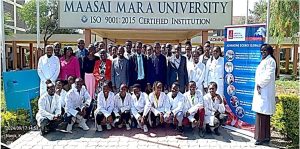
Microbiology workshop held from September 16th 2024 at the Maasai mara University
This workshop marked the third occurrence of such an event in Kenya, following successful workshops at the University of Eldoret and Kabianga University. Over the course of three days, students and staff from Maasai Mara University participated in various activities aimed at promoting the Bachelor of Science in Microbiology program, fostering connections between ASM and the university, and raising awareness about ASM’s initiatives and membership opportunities.
American Society for Microbiologists it’s an international organization with a mission of advancing microbial sciences locally. It’s not new and has been in existence for over 30 years. There are various activities conducted by this organization that will expound on it during the festival. Thanks to the current ambassador for American Society for Microbiologists Kenya Mrs Marystella Injete. We also send our appreciation to Dr Becky Aloo the former ASM ambassador currently a lecturer at UoE. Special regards to our ASM Ambassador from Burkina Faso Mr. Oumarou Soro and Mr. Maanicus Rodolpher Bez-bang, Ambassador Central African Republic.
The program featured a variety of engaging activities, including training sessions on CV writing, career talks, Agar Art, an essay writing competition, “Dance with Microbes,” and the use of Kahoot learning technology for specialized topics in microbiology. The event concluded with an awards ceremony and the cutting of a microbe-themed cake on the final day.
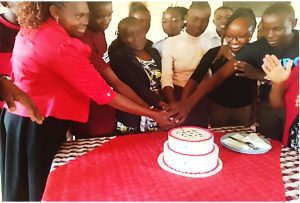
Students and Elizabeth cutting a microbe cake
More than 40 participants attended, including interns, microbiology students, animal health students, and biological sciences staff. Participants gained valuable insights into microbiology and learned about ASM’s activities, membership options, online resources, and professional development opportunities. Winners of each category were awarded gift bags

Students who emerged winners received ASM gift bags
Maasai mara University team was led by Biological sciences chairman Dr Paul Wanjala. Other team members are as follows; Prof. Stella Kirui, Associate Prof Biological sciences, Dr Dominic Menge, Snr Lecturer and Dean school of pure and applied sciences; Mercy Kirumba Lecturer; Elizabeth Siameto Lecturer; Lydia Kiptum laboratory technologist and Doryce Ndubi a laboratory technologist.
The Department of Biological Sciences wishes to acknowledge all our teaching, support staff, interns and students who made the two-day microbiology workshop a great success. Let us walk and work together to scale the heights. There are many career options available for individuals with a degree in microbiology—from industry to consulting to working in non-profits.
The Department of Animal Health and Production will be participating in a webinar-Universities Federation for Animal Welfare-Animal Welfare Student Scholars Meeting 2023 on the 12th of December starting at 12:50 pm-6:50 pm.
One of our final year students -Grace Muita (DAHP 4th year) will be making a short presentation on a research project titled “Assessment of Cattle Welfare in Narok Town Slaughterhouse, Narok County, Kenya” at the international seminar facilitated by UFAW/HSA https://www.ufaw.org.uk/ I am the UFAW contact for MMU and the lead supervisor of the project.
The seminar is open to participants with an interest in Animal Welfare. The link for registration to the seminar is https://register.gotowebinar.com/rt/1930502059320577879
IMPACTS OF INDUSTRIAL LIVESTOCK SYSTEMS, ANIMAL WELFARE AND CRUEL EXPLOITATION OF WILD ANIMALS ENGAGEMENT SEMINAR
The Department of Forestry and Wildlife, School of Natural Resource, Tourism and Hospitality in collaboration with the World Animal Protection – Kenya recently held a student engagement seminar, focusing on Factory Livestock Farming; Animal Welfare Concerns and Exploitation of Wild Animals at Maasai Mara University. The World Animals Protection is a global animal welfare organisation whose vision is a world where animals live free from suffering, cruelty and exploitation. The interactive session, which drew close to 200 students and 10 academic staff, was held on Tuesday 21st June, 2022. The platform also advocated for community led solution and policy formulation, by both youth and academia. These are emerging concerns that cut across wildlife management and conservation; animal health and production; sustainable tourism; and ecosystem health.
The forum was opened by Prof. Francis Mburu, the Dean, School of Natural Resource, Tourism and Hospitality. He introduced the panelists and thanked the World Animal Protection for choosing to partner with the institution of higher learning to launch the “Hidden Health Impacts of Industrial Livestock Systems” Report. He reiterated that institutional partnerships and interactive approaches not only contribute to mentorship and producing market driven problem solving graduates, but also offers them platforms to contribute to emerging concerns and promote critical thinking. His sentiments were echoed by Prof. Romulus Abila, the Director of Graduate Studies, Maasai Mara University. He called for community and academia led solutions to avert emergence of infectious zoonotic diseases, attributed to poor animal welfare, loss of ecological integrity and poor advocacy among community members; especially in the face of malnutrition, food insecurity, water security issues, disasters and climate change.
Mr. Raphael Omondi, Humane Education Manager and Campaign Manager at World Animal Protection – Kenya introduced his organisations roles in changing mind-sets to end animal quality and suffering; educating students and communities on animal rescue in disaster areas; and promoting lifestyle choices that protect animal rights. He invited the students to interact with WAP through campaigns such as mass animal treatment and vaccination campaigns; stopping cruel factory farming; ending wildlife pet trade; helping animals during disasters; and call upon the South African government to ban trophy hunting. Trophy hunting is the killing of an animal for sport or pleasure in order to display part or all of its body as a trophy. It is a horrific and cruel practice that has egregious animal welfare and conservation and impacts.
Dr. Kelvin Momanyi, Farming Campaigns Manager, World Animal Protection – Kenya presented on “Animal Welfare in Global Food Systems and Wildlife Protection”. He briefed the audience on the ‘Five Animal Freedoms’, ascribed by the World Organisation for Animal Health, namely: Freedom from hunger, malnutrition and thirst; Freedom from fear and distress; Freedom from heat stress or physical discomfort; Freedom from pain, injury and disease; and Freedom to express normal patterns of behaviour.
In his presentation, he linked the clear evidence of welfare concerns associated with poor animal husbandry techniques, environmental degradation and unsustainable tourism practices attributed to increased demand for animal protein and growing illegal demand for wildlife trophies and derivative products. Food systems can also impact the tourism industry negatively, as it could compromise quality and quantity especially though Salmonella infection and heavy metals ingestion. Additionally, wildlife concerns too have not been left behind, manifested through increased poaching; retaliatory killings and poisoning; emerging infectious disease and change in wildlife behaviour. These can be attributed to unsustainable agricultural intensification change and land use change; increased encroachment into wildlife habitats (animals act as reservoirs of diseases and vectors); unchecked exploitation of wildlife and derivative products; increased travel due to enhanced transport infrastructure in wildlife habitats; climate change; poor health governance policies and early detection / monitoring of diseases; and lack of awareness among the citizenry. Of great concern was increased incidents of anti-microbial resistance (AMR), a global health and development threat. According to the World Health Organisation, Antimicrobial Resistance (AMR) when bacteria, viruses, fungi and parasites change over time and no longer respond to medicines making infections harder to treat and increasing the risk of disease spread, severe illness and death. As a result of drug resistance, antibiotics and other antimicrobial medicines become ineffective and infections become increasingly difficult or impossible to treat.
Dr. Patrick Kamundia, Chair of Animal Health and Production Department, thanked the visiting team for the timely impactful session. He reiterated the need to inter-disciplinary learning and engagement especially the towards the One-Health Approach. According to the Centre of Disease Control, One Health is a collaborative, multi-sectoral, and transdisciplinary approach — working at the local, regional, national, and global levels — with the goal of achieving optimal health outcomes recognizing the interconnection between people, animals, plants, and their shared environment. Dr. Kamundia urged students to embrace opportunities along the lines of animal welfare through active engagement in animal health sensitization drives; disease surveillance (genetics) and treatment; and policy development, with the aim of contributing to health and safety. He also advocated for increased indigenous knowledge use and documentation in addressing food security; environmental management and animal welfare.
The session was concluded by a summary from Mr. Waswala Brian, Asst. Lecturer at the Department of Forestry and Wildlife, who advocated for a trans-disciplinary approach in addressing current and emerging issues in the animal-tourism-environment nexus. In his conclusion, he affirmed was optimism that through active engage of students in inter-disciplinary peer-peer learning culture; increased complimentary inter-agency communication and collaboration; and holding policy makers / institutions to account, great strides can be made towards achievement of the Vision 2030, the Big Four Agenda, a myriad of UN SDGs and One-Health objectives.
Maasai Mara University is located in Narok town, a critical area of livestock husbandry and wildlife conservation of both community and touristic opportunities. It is thus prudent that welfare and conservation concerns be emphasized through student engagement, community empowerment and active scientific research. This collaborative gathering contributed to the achievement of Maasai Mara University’s Strategic Plan 2019-2024 Focus Areas namely: Strategic Focus Area 1: To be a Centre of Excellence in Environmental Resource Management and Conservation; Strategic Focus Area 2: Increase of University Visibility and Community Outreach Services; and Strategic Focus Area 3: Promote quality teaching, learning and training.
Do you know:
- 60% of all emerging infectious diseases in humans are zoonotic;
- Livestock serves as an epidemiological infection bridge between wildlife and humans;
- Viruses are the most likely type of emerging pathogens;
- Human-livestock interaction enhances the chances of spill-over; and
- COVID-19, Ebola, swine flu, bird flu, and SARS are examples of recent zoonotic diseases.
Report by:
Mr. Waswala Brian Olewe
Contact email: waswala@mmarau.ac.ke
ENDS
//
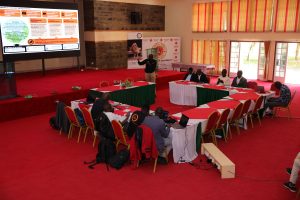
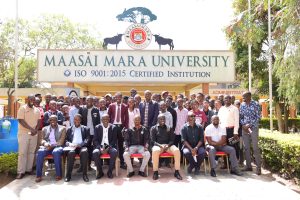
Promoting Conservation among the Youth through Experiential Learning and Skill Impartation
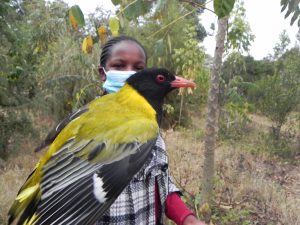 The hand-on ornithology session was recently hosted by the Maasai Mara University’s Department of Forestry and Wildlife Management (School of Natural Resources, Tourism and Hospitality). It was conducted by staff of the National Museums of Kenya – Ornithology Section in collaboration with Nature Kenya.
The hand-on ornithology session was recently hosted by the Maasai Mara University’s Department of Forestry and Wildlife Management (School of Natural Resources, Tourism and Hospitality). It was conducted by staff of the National Museums of Kenya – Ornithology Section in collaboration with Nature Kenya.
The inter-disciplinary sessions, drew in students pursuing diverse courses in Forestry and Wildlife Management; Tourism Management; Animal Health and Production; and Environmental Studies. The students gained practical skills in bird identification, capture and release techniques among others.
These competency-based skills are vital as they mainstream knowledge on avian (wildlife) population dynamics; avian geo-spatial and temporal distribution; animal welfare and wildlife disease surveillance; avian tourism; and ecosystem health. The skill impartation among the students contribute to achievements of the National Wildlife Strategy 2030, 2030 National Tourism Blueprint and the a myriad of UN Sustainable Development Goals.
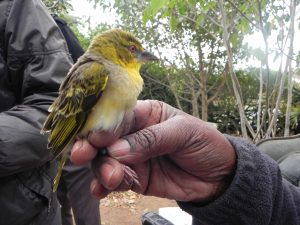
This event offered a platform for peer-to-peer learning among student and institutional synergies. The practical sessions also sort to nurture, empower and encouraged female students to take up Science Technology, Engineering and Mathematics (STEM) related courses in line with Kenya’s Vision 2030.
Over 55 bird species were identified within the university during the practical fieldwork session including 3 species of Palearctic migrants.
Talk on Thursday 17th Oct 2019 in the School of Science Postgraduate room at 10 am by
Prof. Patricia B.C. Forber- Professor of analytical chemistry at University of Pretoria, South Africa
Title of presentation: Alternative approaches to trace organic air pollutant sampling.
Opex joint training between the school of business and economics, university of Munster, Germany, and school of business and economics, Maasai Mara University, Kenya. On 1stand 2nd august, 2018. At the school of the business boardroom, Maasai Mara University.
The realization of the MoU signed between School of Business and Economics, University of Munster, Germany and School of Business and Economics, Maasai Mara University, Kenya, will come to the realization on 1stand 2nd August 2018 through joint training.
Professor, Joerg Baetge from the University of Munster, Germany will carry out training on Management Training with Computer Simulation Game (OPEX) to participants drawn from Industry and Academia in the School of Business and Economics boardroom, Maasai Mara University.
To enhance partnership, the School of Business and Economics, University of Munster, will then donate OPEX module to School of Business and Economics, Maasai Mara University, to enhance Business students’ ability to start and manage businesses.
Workshop held on 14/6/2022 at Maasai Mara University Conference hall Facilitated By Commission on Administrative Justice (CAJ) Mr. Sammy Cheboi (Assistant Director, Public Education, Advocacy & Corporate Communications ).
- The mandate of the office of the Ombudsman on Administrative justice and Access to Information: The nexus with the Maasai Mara University
- Background on the right to information: importance & instrumentality of this rights as espoused in Art. 35 of the Constitution.
- An overview of the access to information act, 2016: best practices & the obligations on public entities.
- An overview of the Resolution public complaints management within the university: introspection and sharing experiences.
- Effective complaints handling mechanisms: best practices, complaints management framework & models.
- Open session – Delving into the issues of unresponsiveness: What/Where is the missing/ weakest link?
